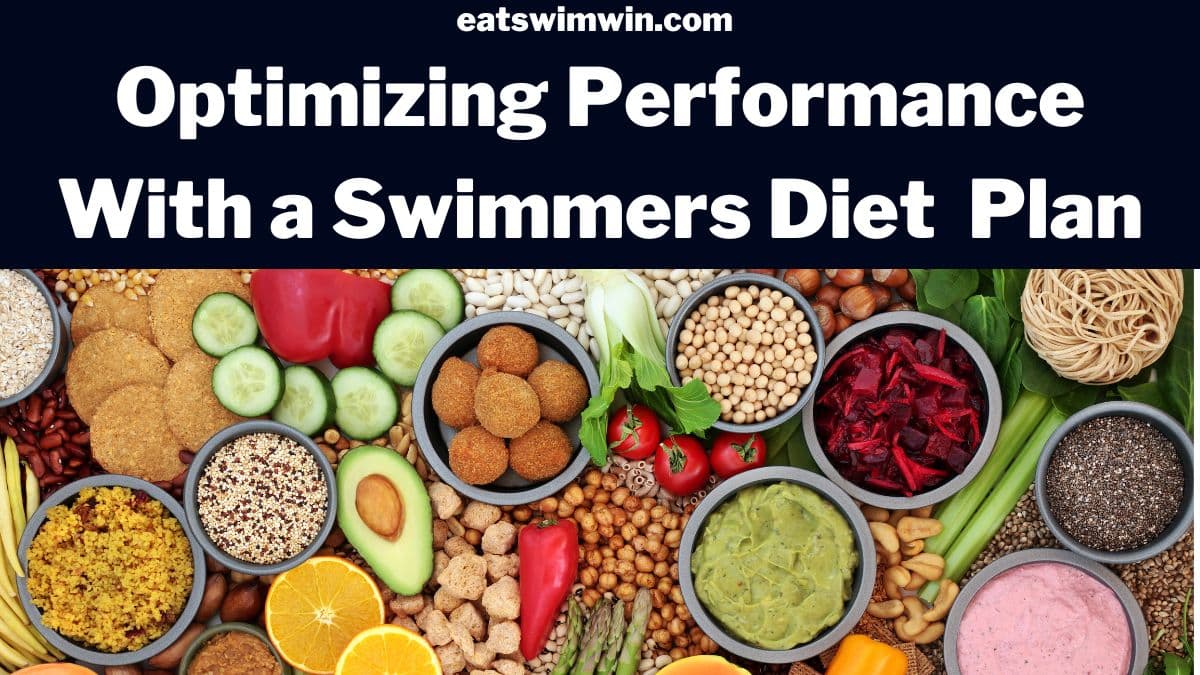
Fueling Your Fitness: A Comprehensive Guide to Swimming Nutrition and Diet Planning
Swimming, a demanding endurance sport, requires a finely tuned nutritional strategy to optimize performance, recovery, and overall well-being. Unlike some sports with intermittent high-intensity bursts, swimming necessitates sustained effort, placing consistent demands on the body’s energy stores. This article delves into the intricacies of swimming nutrition, offering a comprehensive guide to crafting a personalized diet plan that fuels your training and helps you achieve your swimming goals.
Understanding the Energy Demands of Swimming
Swimming is a highly aerobic activity, relying heavily on the body’s aerobic energy system. This system utilizes oxygen to break down carbohydrates and fats, producing adenosine triphosphate (ATP), the primary energy currency of the cells. The intensity and duration of your swim workouts will determine the primary fuel source:
- Longer, endurance swims: These primarily rely on fat as a fuel source. The body efficiently utilizes stored fat for sustained energy production.
- High-intensity interval training (HIIT): HIIT sessions heavily rely on carbohydrate stores (glycogen) for quick energy bursts. Adequate carbohydrate intake is crucial to avoid fatigue and ensure optimal performance.
- Sprint training: Sprint training is highly demanding and heavily relies on both carbohydrate and creatine phosphate stores for immediate energy.
Macronutrient Distribution for Swimmers
The optimal macronutrient distribution for swimmers varies depending on training volume, intensity, and individual metabolic needs. However, a general guideline is as follows:
-
Carbohydrates (45-65% of total calories): Carbohydrates are the primary fuel source for swimming, particularly during intense workouts. Choose complex carbohydrates like whole grains, fruits, vegetables, and legumes over refined carbohydrates like white bread and sugary drinks. These complex carbohydrates provide sustained energy release, preventing energy crashes. The closer you get to a competition, you might consider slightly increasing carbohydrate intake through carbohydrate loading to maximize glycogen stores.
-
Proteins (15-25% of total calories): Protein is essential for muscle repair and growth, crucial for recovery after intense training sessions. Swimmers should prioritize lean protein sources like chicken breast, fish, turkey, beans, lentils, and tofu. Sufficient protein intake helps prevent muscle breakdown and promotes optimal muscle function.
-
Fats (20-35% of total calories): Fats provide sustained energy, particularly during longer swims. Focus on healthy fats like avocados, nuts, seeds, olive oil, and fatty fish (rich in omega-3 fatty acids). Healthy fats also contribute to hormone production and overall health.
Micronutrients: The Unsung Heroes
While macronutrients provide the bulk of energy, micronutrients play a critical role in various metabolic processes essential for swimming performance. These include:
- Iron: Essential for oxygen transport in the blood. Iron deficiency can lead to anemia, impacting endurance and performance. Good sources include red meat, spinach, and lentils.
- Calcium: Important for bone health, particularly relevant for swimmers who experience repetitive stress on their bones. Dairy products, leafy greens, and fortified foods are good sources.
- Vitamin D: Plays a role in calcium absorption and bone health. Sunlight exposure and fortified foods are good sources.
- B Vitamins: Essential for energy metabolism and red blood cell production. Good sources include whole grains, meat, poultry, and leafy green vegetables.
Hydration: The Foundation of Performance
Hydration is paramount for optimal swimming performance. Dehydration can significantly impair performance, leading to fatigue, muscle cramps, and decreased endurance. Swimmers should consistently drink water throughout the day, especially before, during, and after training sessions. Electrolyte drinks can be beneficial during long or intense workouts to replace electrolytes lost through sweat.
Sample Diet Plan for a Swim Training Week
This sample diet plan is a general guideline and should be adjusted based on individual needs, training volume, and goals. Consult with a registered dietitian or sports nutritionist for personalized recommendations.
Monday (Easy Swim):
- Breakfast: Oatmeal with berries and nuts
- Lunch: Salad with grilled chicken or fish
- Dinner: Lentil soup with whole-wheat bread
- Snacks: Greek yogurt, fruit, trail mix
Tuesday (Interval Training):
- Breakfast: Whole-wheat toast with avocado and egg
- Lunch: Chicken breast sandwich on whole-wheat bread with a side salad
- Dinner: Salmon with roasted vegetables
- Snacks: Banana with peanut butter, energy bar
Wednesday (Rest or Cross-Training):
- Breakfast: Scrambled eggs with spinach and whole-wheat toast
- Lunch: Leftovers from dinner
- Dinner: Chicken stir-fry with brown rice
- Snacks: Apple slices with almond butter, cottage cheese
Thursday (Interval Training):
- Breakfast: Smoothie with fruits, vegetables, and protein powder
- Lunch: Tuna salad sandwich on whole-wheat bread
- Dinner: Lean ground beef with sweet potato and broccoli
- Snacks: Hard-boiled egg, rice cakes with hummus
Friday (Easy Swim):
- Breakfast: Yogurt parfait with granola and berries
- Lunch: Leftovers from dinner
- Dinner: Vegetarian chili with whole-wheat crackers
- Snacks: Orange slices, almonds
Saturday (Long Swim):
- Breakfast: Pancakes made with whole-wheat flour with fruit and syrup
- Lunch: Turkey breast sandwich on whole-wheat bread with a side salad
- Dinner: Pasta with marinara sauce and vegetables
- Snacks: Energy gels or chews during the swim, banana
Sunday (Rest):
- Breakfast: Waffles with fruit and syrup
- Lunch: Pizza with whole-wheat crust and vegetables
- Dinner: Roast chicken with roasted potatoes and green beans
- Snacks: Popcorn, fruit salad
Pre- and Post-Workout Nutrition
- Pre-workout: A light carbohydrate snack 30-60 minutes before your swim, such as a banana or a small bowl of oatmeal, can provide readily available energy.
- Post-workout: Within 30-60 minutes after your swim, consume a combination of carbohydrates and protein to replenish glycogen stores and promote muscle repair. A protein shake with fruit or a sandwich with lean protein and whole-wheat bread are good options.
Monitoring Progress and Adjustments
Regularly monitor your energy levels, performance, and body composition. Adjust your diet plan as needed based on your training schedule and how your body responds. Consider keeping a food journal to track your intake and identify areas for improvement. Remember, consistency is key. A well-planned and consistently followed nutrition plan is crucial for achieving your swimming goals.
Conclusion
Swimming nutrition is a crucial component of maximizing your performance and well-being. By focusing on a balanced diet rich in complex carbohydrates, lean protein, healthy fats, and essential micronutrients, along with consistent hydration, you can fuel your training, optimize recovery, and achieve your swimming goals. Remember to consult with a registered dietitian or sports nutritionist for personalized advice tailored to your individual needs and training regimen. They can help you create a nutrition plan that supports your unique requirements and helps you reach your full potential in the water.



